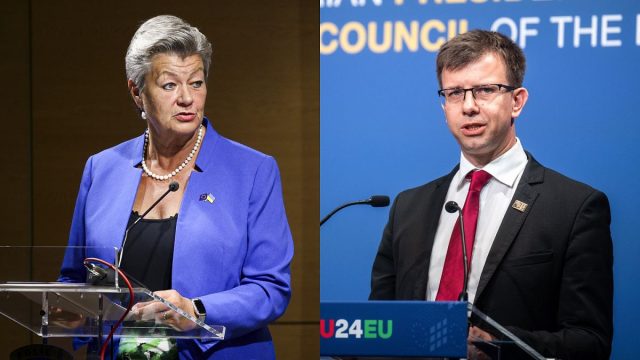The European Commission has sent a second letter to Hungary asking for further clarification on its national card system. The Hungarian government, however, dismisses the criticism as “hysteria.”
Brussels witnessed on Wednesday an exchange of contradictory speeches on Hungary’s recent decision to extend its national card to Russian and Belarusian citizens, a move that has stoked fears that it is a backdoor for espionage and sanctions evasion.
The system offers certain nationalities a simplified procedure to obtain work permits, with the option of family reunification. It lasts two years and can be renewed for another three, which paves the way for long-term residence.
Initially, the national card was only available to Ukrainian and Serbian citizens. But in July it was amended to include Bosnia-Herzegovina, Moldova, North Macedonia and Montenegro, as well as Russia and Belarus. The news coincided with the diplomatic repercussions of the controversial visit of the Hungarian Prime Minister, Viktor Orbán, to Moscow.
For Ylva Johansson, European Commissioner for Home Affairs, the inclusion of Russia and Belarus in this system raises “serious” concerns and represents a potential threat to the security of “the entire” Schengen area, he declared on Wednesday during an hour-long hearing in the European Parliament focused on this issue.
The EU considers Russia and Belarus as “hostile” nations
Johansson openly questioned the logic of giving the same treatment to two “hostile” nations than six candidates to enter the EU and said the economic benefits of bringing in guest workers from Russia and Belarus appear “limited” and “disproportionate” compared to the domestic risks, citing recent cases of sabotage, espionage and cyberattacks.
In summer 2022, The EU suspended its visa facilitation agreement with Russia and agreed to intensify scrutiny over future applications submitted by Russian visitors. The measures caused a decrease of 88% in visas issued to Russian citizens, Johansson said, and additional initiatives may be necessary in the coming months.
“It’s time to watch, not to let your guard down. “This is not the time to be soft on security,” he said. “Within the Schengen area, we must keep each other safe.”
Johansson, however, stressed that his services have not detected any violation of EU law and that, therefore, they will not take legal action against the Hungarian Government, at least until the internal evaluation is completed.
The Commission continues to study the responses provided by Budapest in response to a letter sent on August 1. Hungary’s responses left some aspects “unclear”, Johansson told MEPs, and a second letter has been sent to clarify two aspects of the national card system, including the questions:
- Why does Hungary consider the extension to Russian and Belarusian citizens necessary and appropriate in the current geopolitical context?
- Why does Hungary not apply differentiated security checks to Russian and Belarusian applicants despite the higher security risks?
The response time ends on September 11.
To the question of whether the changes in the national card system They deserve Hungary’s expulsion from the Schengen areaJohansson stumbled carefully. “The suspension of a member from the Schengen area is a very, very important decision, and I really don’t see it happening,” he said.
Budapest denounces “political hysteria”
A few hours before the commissioner appeared before the legislators, János Bóka, Hungarian Minister of European Affairs, held a preventive press conference and painted a completely different picture of the situation.
Bóka said that the extension of the visa system to Russian and Belarusian citizens was necessary to alleviate labor shortage on the Hungarian market and give employers an “easier procedure” to attract foreign workers. The minister insisted the changes were compatible with EU law and did not relax entry and visa requirements.
Regarding the moment chosen for the announcement, coinciding with the meeting between Viktor Orbán and Vladimir PutinBóka said it was “strictly a coincidence.” “The national card system poses no risk to national securitypublic security or public order of Hungary or the European Union,” Bóka told reporters.
“The system contains certain facilities related to employment. It complies with the regulations related to the issuance and entry of visas in all aspects,” he added.
Since the extension came into effect in July, Hungary has granted 10 permits to Russians and four to Belarusianssaid Bóka to calm the anger. However, the small number was later used by Johansson to question the justification for the extension.
Throughout the press conference, the minister denounced a case of “political hysteria” created by the European Parliament and “certain” Member States, which it did not name. Last month, Baltic and Nordic countries wrote a joint letter warning that Hungary’s recent actions “may constitute a serious security risk.”
The Commission, Bóka said, should be “strong enough to resist political pressure“and leave National Security matters in the hands of Intelligence experts.
Next to the minister, Fidesz MEPs András László and Kinga Gál denounced the criticism against the Government as “unfounded claims” “malicious disinformation” and “a new hypocritical attack” against Hungary.
The new confrontation between Brussels and Budapest occurs in parallel to another dispute related to a fine of 200 million euros imposed by the European Court of Justice, which Hungary has so far refused to pay.







